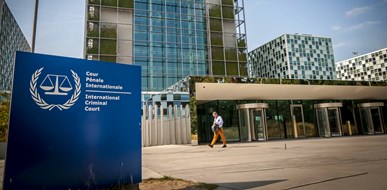[New blog post] Is Ukraine finally breaking its 24-year International Criminal Court commitment phobia?
Published 20 September 2024By Gabriela Radu

In a new blog post, Asser Institute researcher Gabriela Radu writes that after decades of delays and debates, Ukraine is finally on the brink of joining the International Criminal Court. While the ratification of the Rome Statute is a significant step, the country still faces hurdles in implementing necessary domestic legislation to ensure full compliance with the treaty.
After 24 years of delays, Ukraine is nearing full membership of the International Criminal Court (ICC), writes researcher Gabriela Radu in her blog post entitled 'Is Ukraine finally breaking its 24-year International Criminal Court commitment phobia?'. Last month, on 21 August 2024, the Ukrainian Parliament ratified the Rome Statute, the treaty that established the International Criminal Court, signaling a serious intent to join the court. President Volodymyr Zelensky underscored this by symbolically signing the ratification bill on 24 August, Ukraine’s Independence Day.
However, despite these significant moves, Ukraine's full accession to the ICC is contingent upon further domestic legislative changes. The Rome Statute Ratification Bill 3909 requires that Ukraine align its Criminal Code and Criminal Procedural Code with the statute before the ratification can officially take effect. As a result, Ukraine has yet to deposit its ratification instrument with the United Nations, unlike other states that became ICC members immediately after ratifying the Rome Statute.
Heated debate
A heated debate continues within Ukraine over how to best implement these necessary legislative reforms. While some favour comprehensive reforms that would signal strong commitment to international justice, others advocate a more gradual approach to avoid political and military pushback.
The delays, debates, and false starts have been influenced by the prevalence of myths and propaganda about the Rome Statute and the ICC in Ukrainian political, military, and public circles. One concern is that ratification would expose Ukrainian soldiers to ICC prosecutions, although the ICC already has jurisdiction via Ukraine's prior declarations.
Others fear that ratifying undermines sovereignty, although the ICC intervenes only when national courts are unwilling or unable to prosecute (complementarity principle). There are also misconceptions about retroactive justice and the scope of ICC prosecutions. Misinformation, partly from alleged Russian efforts, underscores the need for public education on the ICC's true role and limitations. This is especially pertinent given that over one million Ukrainians serve in the armed forces, making this a deeply personal issue for many.
Constitutional hurdles
Ukraine’s path to the ICC has been marred by constitutional hurdles and political delays. Despite this, it has previously accepted the ICC’s jurisdiction for specific periods, notably in relation to crimes committed during the 2014 Maidan protests and the annexation of Crimea. Now, with war crimes investigations mounting, Ukraine is under pressure to join the Court as a member state with rights, and aims to do so in time for the twenty-third session of the ICC Assembly of State Parties in December 2024.
As Gabriela Radu writes: 'After over two decades of debates and delays, and years of extensive discussions with Ukrainian military representatives to mitigate fears and reassure them that the ICC’s focus would be on the most serious crimes and those bearing the greatest responsibility, the time has finally come for Ukraine to move beyond symbolic gestures of ratification "happening in the media," (…), and to advance with real, substantive legal reforms that align with international justice standards.'
Read the full blog post.
About Gabriela Radu
Gabriela is a junior researcher at the Asser Institute within the research strand 'In the public interest: accountability of the state and prosecution of crimes', working primarily on the 'Restoring Justice and Dignity in Ukraine' project and the MATRA-Ukraine project 'Strengthening Ukraine’s Capacity to Investigate and Prosecute International Crimes'. Her role focuses on supporting key Ukrainian justice actors to investigate, prosecute, adjudicate and monitor international crimes.
About the “Restoring Justice and Dignity in Ukraine” project
The ‘Restoring Dignity and People-Centred Justice in Ukraine: A Whole-of-Government Approach to Advancing Accountability for International Crimes' project focuses on advancing accountability for international crimes committed in Ukraine. The full project is funded by the Netherlands Ministry of Foreign Affairs and is implemented by the International Development Law Organization (IDLO), in partnership with the T.M.C. Asser Instituut, the Center for International Legal Cooperation (CILC), and the Netherlands Helsinki Committee (NHC).
About MATRA-Ukraine
The MATRA project 'Strengthening Ukraine’s Capacity to Investigate and Prosecute International Crimes' is a joint initiative of the T.M.C. Asser Instituut and Global Rights Compliance. The project is designed to assist investigators, the Office of the Prosecutor General and regional prosecutors' offices, judges, CSOs, journalists and defence lawyers in Ukraine to investigate, prosecute, adjudicate and monitor international crimes. The project is funded by the Netherlands Ministry of Foreign Affairs under the MATRA (MAatschappelijke TRAnsformatie: social transformation) Programme and supported by the Netherlands Ministry of Justice and Security.

